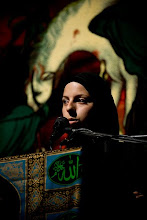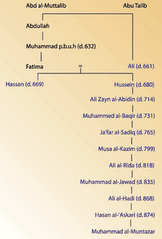Acknowledging the Arrival of the Month of Ramadan during the Day
Q: Assuming it is announced, before the canonical noon, that today is the first day of the month of Ramadan, what is one’s duty on that day?
A: Assuming one hasn’t, until then, committed any deed which would invalidate one’s fast, obligatory caution dictates that one ought to make one’s intention to fast and then actually fast on that day in addition to observing its compensatory fast (after the month). However, assuming such a deed was, in fact, committed, then one’s fasting would be void; however, out of respect and honour to the month of Ramadan, one must refrain from committing any action which invalidates fasts until the maghrib adhān and observe the required compensatory fast after the month.
Methods of Proving the Arrival of the Month
Q: Assuming a number of just people bear testimony to the fact that two just people have in fact witnessed the (new) moon, will the arrival of the months of Ramadan or Shawwāl be subsequently proved?
A: No, one must be informed directly by the two just people (who have observed the new moon) themselves. Intermediary reports of the moon’s observation are not sufficient save on occasions where it leads to one’s acquiring certainty in relation to the moon’s appearance.
How to Acknowledge the Observation of the New Moon?
Q: After hearing the reports of a number of people, assuming one conjectures that tomorrow is ‘Id al-Fitr, may one fast on that day?
A: Until one is almost sure that tomorrow is ‘Id al-Fiṭr, the first of Shawwāl, one cannot break one’s fast on that day.
The Criterion in Relation to United Horizons
Q: What does the beholding of the same horizons actually mean? Which areas are deemed as having the same horizon?
A: It means that they are the same as to how possible/impossible it is to sight the crescent.
Witnessing the new moon before maghrib
Q: In some countries, such as Sweden, it is not possible to observe the new moon of the month of Shawwāl after sunset but 2-3 days after the moon’s observation in Iran due to the fact that, in these countries, the moon sets before the sun. Assuming that, in countries like Sweden, it is possible to view the new moon before sunset, would this much be sufficient vis-à-vis proving the new moon of the month of Shawwāl?
A: Observing the new moon before sunset is sufficient in relation to proving the start of the new month as commencing from the night which follows (i.e. not from the night before).
One’s Duty on Occasions Where marji‘s Differ in Relation to the Announcement of ‘Id al-Fitr
Q: Assuming differences arise amongst the religious authorities with respect to the affirmation of ‘Id al-Fitr, what is one’s duty? Ought each follower to refer to his/her own marja‘?
A: Following one’s marji‘has no role in relation to the new moon’s affirmation; rather, assuming one acquires certainty, with respect to the new moon, by means of a marji‘s announcement then one ought to break one’s fast on that day. Assuming one has doubt (post-announcement) in relation to the matter, then he/she must fast on that day.
To See the Crescent Moon or to Depend on the Testimony of Two Just Persons
Q: If somebody saw the crescent moon but the authorized religious authority did not issue a rule on sighting, what is the ruling? Also, if two just people gave testimony about their sighting but the said authority did not give his rule, what is people’s responsibility?
A: Whoever sees the crescent himself/herself or two just people testify their seeing before him/her, suffices with his/her seeing or the testimonies of the two just individuals and he/she is not in need of the rule of the authorized religious authority.
Controversy about Crescent Moon’s Sighting
Q: If controversy happens between two reliable, big groups about the sighting of the crescent moon (of the month of Ramadan or Shawwal), what can we do?
A: If they differ in sighting is proved or not and if among those who claim sighting there are just persons who testify that they saw it, one should accept theirs. But, if one group say it is proved that the moon is sighted and the second group say it is proved that the moon is not sighted, the two claims contradict each other and neither of them is reliable.
Saying of the Astronomers versus Witnesses’ Testimony to Sighting the Crescent
Q: Would you mind to show us the shar‘ī stand towards the testimony of witnesses to sighting the new crescent moon while astronomers claim that sighting is impossible.
A: If the saying of the astronomers brings confidence that the testimony of the witnesses is wrong, the testimony has no shar‘ī standing.
Q: Assuming it is announced, before the canonical noon, that today is the first day of the month of Ramadan, what is one’s duty on that day?
A: Assuming one hasn’t, until then, committed any deed which would invalidate one’s fast, obligatory caution dictates that one ought to make one’s intention to fast and then actually fast on that day in addition to observing its compensatory fast (after the month). However, assuming such a deed was, in fact, committed, then one’s fasting would be void; however, out of respect and honour to the month of Ramadan, one must refrain from committing any action which invalidates fasts until the maghrib adhān and observe the required compensatory fast after the month.
Methods of Proving the Arrival of the Month
Q: Assuming a number of just people bear testimony to the fact that two just people have in fact witnessed the (new) moon, will the arrival of the months of Ramadan or Shawwāl be subsequently proved?
A: No, one must be informed directly by the two just people (who have observed the new moon) themselves. Intermediary reports of the moon’s observation are not sufficient save on occasions where it leads to one’s acquiring certainty in relation to the moon’s appearance.
How to Acknowledge the Observation of the New Moon?
Q: After hearing the reports of a number of people, assuming one conjectures that tomorrow is ‘Id al-Fitr, may one fast on that day?
A: Until one is almost sure that tomorrow is ‘Id al-Fiṭr, the first of Shawwāl, one cannot break one’s fast on that day.
The Criterion in Relation to United Horizons
Q: What does the beholding of the same horizons actually mean? Which areas are deemed as having the same horizon?
A: It means that they are the same as to how possible/impossible it is to sight the crescent.
Witnessing the new moon before maghrib
Q: In some countries, such as Sweden, it is not possible to observe the new moon of the month of Shawwāl after sunset but 2-3 days after the moon’s observation in Iran due to the fact that, in these countries, the moon sets before the sun. Assuming that, in countries like Sweden, it is possible to view the new moon before sunset, would this much be sufficient vis-à-vis proving the new moon of the month of Shawwāl?
A: Observing the new moon before sunset is sufficient in relation to proving the start of the new month as commencing from the night which follows (i.e. not from the night before).
One’s Duty on Occasions Where marji‘s Differ in Relation to the Announcement of ‘Id al-Fitr
Q: Assuming differences arise amongst the religious authorities with respect to the affirmation of ‘Id al-Fitr, what is one’s duty? Ought each follower to refer to his/her own marja‘?
A: Following one’s marji‘has no role in relation to the new moon’s affirmation; rather, assuming one acquires certainty, with respect to the new moon, by means of a marji‘s announcement then one ought to break one’s fast on that day. Assuming one has doubt (post-announcement) in relation to the matter, then he/she must fast on that day.
To See the Crescent Moon or to Depend on the Testimony of Two Just Persons
Q: If somebody saw the crescent moon but the authorized religious authority did not issue a rule on sighting, what is the ruling? Also, if two just people gave testimony about their sighting but the said authority did not give his rule, what is people’s responsibility?
A: Whoever sees the crescent himself/herself or two just people testify their seeing before him/her, suffices with his/her seeing or the testimonies of the two just individuals and he/she is not in need of the rule of the authorized religious authority.
Controversy about Crescent Moon’s Sighting
Q: If controversy happens between two reliable, big groups about the sighting of the crescent moon (of the month of Ramadan or Shawwal), what can we do?
A: If they differ in sighting is proved or not and if among those who claim sighting there are just persons who testify that they saw it, one should accept theirs. But, if one group say it is proved that the moon is sighted and the second group say it is proved that the moon is not sighted, the two claims contradict each other and neither of them is reliable.
Saying of the Astronomers versus Witnesses’ Testimony to Sighting the Crescent
Q: Would you mind to show us the shar‘ī stand towards the testimony of witnesses to sighting the new crescent moon while astronomers claim that sighting is impossible.
A: If the saying of the astronomers brings confidence that the testimony of the witnesses is wrong, the testimony has no shar‘ī standing.










